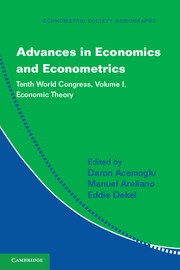Book contents
- Frontmatter
- Contents
- Contributors
- Preface
- I NONSTANDARD MARKETS
- II CONTRACTS
- III DECISION THEORY
- 7 Ambiguity and the Bayesian Paradigm
- 8 Temptation
- 9 Comments on “Behavioral” Decision Theory
- IV COMMUNICATION/ORGANIZATIONS
- V FOUNDATIONS: EPISTEMICS AND CALIBRATION
- VI PATENTS: PROS AND CONS FOR INNOVATION AND EFFICIENCY
- Name Index
- Miscellaneous Endmatter
8 - Temptation
Published online by Cambridge University Press: 05 May 2013
- Frontmatter
- Contents
- Contributors
- Preface
- I NONSTANDARD MARKETS
- II CONTRACTS
- III DECISION THEORY
- 7 Ambiguity and the Bayesian Paradigm
- 8 Temptation
- 9 Comments on “Behavioral” Decision Theory
- IV COMMUNICATION/ORGANIZATIONS
- V FOUNDATIONS: EPISTEMICS AND CALIBRATION
- VI PATENTS: PROS AND CONS FOR INNOVATION AND EFFICIENCY
- Name Index
- Miscellaneous Endmatter
Summary
Introduction
This survey discusses decision-theoretic models of agents who seek to constrain and regulate their own future behavior. The common theme is that the decision maker's future utility is affected by unwanted temptations. The wish to eliminate temptations from future option sets creates a preference for commitment. The surveyed models explore the relationship between temptations and other psychological phenomena, such as self-control, self-deception, guilt, and shame.
An experimental literature in psychology and economics approached these phenomena with different experimental designs, broadly classified into experiments that document choice reversals and those that document a preference for commitment. The first approach confronts subjects with a particular choice at distinct decision dates. If choices at the time of consumption are affected by unwanted temptation, then we would expect the choice at the time of consumption to differ from the same choice made at an earlier stage.
A large experimental literature, surveyed in Frederick, Loewenstein, and O'Donoghue (2002), examines such reversals for intertemporal choices. Specifically, subjects are asked to choose between a smaller period t reward and a larger period t + τ reward. Subjects tend to prefer the smaller reward when t is small but the larger reward when t is large. If the subjects' behavior is stationary, this evidence implies that the same intertemporal trade-off is resolved differently depending on when the decision is made.
- Type
- Chapter
- Information
- Advances in Economics and EconometricsTenth World Congress, pp. 243 - 288Publisher: Cambridge University PressPrint publication year: 2013
- 23
- Cited by

